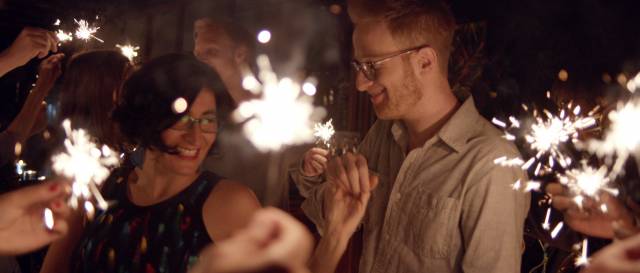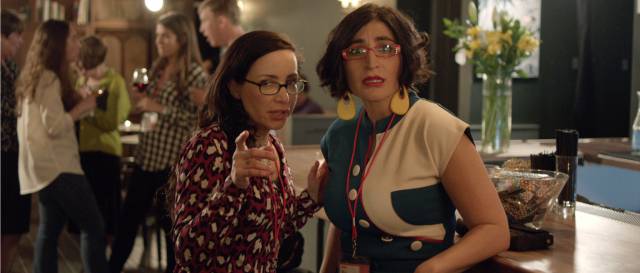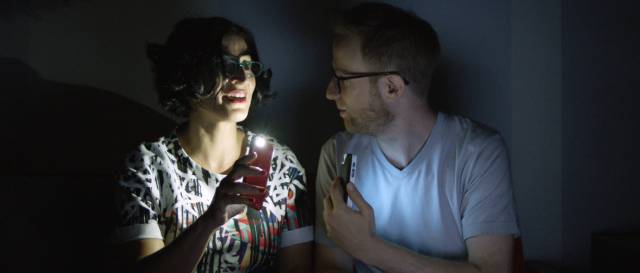
 As any New Yorker will tell you, New York after Hurricane Sandy was no laughing matter. With flooded streets, blackouts, and massive fires, it seemed as if the prophecies from all those terrible summer blockbusters had become a reality. And yet, the tragedy also brought out a warm side of the city that one rarely gets to see, as people from all walks of life helped each other and created beautiful things together. For a short time before the power came back, and the subway went back to its lackluster service, New York was a city of love. Filmmakers Negin Farsad and Jeremy Redleaf have captured this in their delightful comedy 3rd Street Blackout, an inventive, witty romance which sees them play Mina and Rudy, respectively, two lovers who undergo the biggest crisis of their relationship in the midst of a blackout.
As any New Yorker will tell you, New York after Hurricane Sandy was no laughing matter. With flooded streets, blackouts, and massive fires, it seemed as if the prophecies from all those terrible summer blockbusters had become a reality. And yet, the tragedy also brought out a warm side of the city that one rarely gets to see, as people from all walks of life helped each other and created beautiful things together. For a short time before the power came back, and the subway went back to its lackluster service, New York was a city of love. Filmmakers Negin Farsad and Jeremy Redleaf have captured this in their delightful comedy 3rd Street Blackout, an inventive, witty romance which sees them play Mina and Rudy, respectively, two lovers who undergo the biggest crisis of their relationship in the midst of a blackout.
Like in a sexy version of The Day After Tomorrow (Jake Gyllenhaal has got nothing on these two, seriously) Mina and Rudy try to reconnect as they meet a series of charming characters. Making for a wonderful tribute to the city the filmmakers obviously love so much, while also being a flat out superb comedy. I spoke to Farsad and Redleaf about the things their memories of Sandy, the East Village, and what’s next for Mina and Rudy.
What’s your absolute strangest memory of New York City after Sandy?
Negin Farsad: My favorite thing about the East Village during the Blackout was that weirdly that first day, there’s no electricity, sound or much traffic, and people didn’t know what to do, but there were musicians on every corner providing music to the neighborhood. It was unexpected and amazing, everywhere I went there was a great band or solo musicians. It was magical.
Jeremy Redleaf: Like analog Spotify. For me it was that I saw this “tale of two cities”, I was on the last block without power, so the right uptown there was this bustling metropolis where everything was working just as planned, and to my left it was this weird, dark wasteland.
Negin, you spent part of the blackout writing songs with your then-boyfriend. Did they ever see the light of day?
Negin Farsad: I’m gonna be honest, they were fairly terrible songs. So that would be a no. It was sort of the impetus behind doing the rap piano battles in the movie, where we rap at each other.
 The first time I left the house after Sandy was to go out on a date. It was all great until he stopped to buy drugs when he was walking me to the subway...
The first time I left the house after Sandy was to go out on a date. It was all great until he stopped to buy drugs when he was walking me to the subway...
Negin Farsad: Ooh, not a good date move.
Jeremy Redleaf: We’re gonna have to write a sequel with your story.
...his excuse was that the city was so boring without power. So given how chaotic everything was after the hurricane, how did you decide it was the perfect setting for a romantic comedy?
Negin Farsad: I think what was kind of particular to the blackout was that you had to actually communicate. Me and my boyfriend at the time left notes for each other, by pasting them on random building doors, we would leave them with bodega guys, being able to track each other down was a weird and interesting process. Also, the time we spent together we literally had to stare into each other’s eyes and have a conversation. Not being able to binge watch a show was helpful. It made us have a real relationship. That’s not something you can experience anymore unless you’re on like the Galapagos Islands or something. That made the blackout a unique setting to see human beings talk to each other.
Jeremy Redleaf: There’s a reason why in horror movies there is no cell phone service when they’re in trouble. It seemed like an interesting place to start off with a couple in crisis.
Speaking of setting, I love the East Village, why do you think this part of the city ends up so underrepresented in New York popular culture? And what made you want to put it on film?
Negin Farsad: I’ve been living there for like 10 years, I’m obsessed with the East Village. I love living there, “The Chillmaster” from the film is real, he lives across the street from me, he plays music throughout the summer through his window and everybody knows it, and everybody expects it and enjoys it. I love all of the quirky, weird things, people playing jazz and chess, and face painting, all at the same time at Tompkins Square Park. It’s a neighborhood with so many collisions, there’ll be an expensive condo building, right across the street from the projects and that’s just normal. It has a crazy variety of income and social classes that have to live and interact with each other. That’s why you’ll have The Chillmaster inviting me over to his apartment for Hennessy. There’s a guy who goes around putting mosaics, you’ll see him with his dog, he’s committed to doing this. There’s people committed to throwing shoes over the stop lights, the art and mural making in the East Village is very vibrant.
Your characters have qualities that make them seem autobiographical, but how are Mina and Rudy absolutely not like you?
Jeremy Redleaf: I’m terrible at writing code. I know a little bit of HTML and CSS. My parents are both therapists, I think I’m a little bit more forthcoming with my feelings.
Negin Farsad: I’m definitely not a neuroscientist, just wanna make sure that’s clear for everybody. We had another TED Fellow who is a neuroscientist consult on the TED Talk in the film to make sure it made sense. I’m also very dirty mouthed, so I share that with Nina. I like a good swear word. I think Mina is learning how to be a good neighbor, and I’m obsessed with my neighbors, I’m always up in their business.
Both of you guys have done work in shows for children and younger audiences, Jeremy you’re on Sesame Street for instance, what do you think of the prospects of these kids growing up and being fans of your adult work? Are you covering all your bases to make sure you’re forming loyal fanbases? Also, how do you turn this button on and off to avoid cursing at Big Bird for example?
Jeremy Redleaf: I don’t try to convert the kids into lifelong fans. They’ll find their own way if they want. I think it’s hard but most artists have all these different pulls within them, you can curse and be genuine in the same beat. It’s a skill and a muscle to exercise, but usually we’re pretty safe.
 You’re making a film about how phones and technology slightly kill romance, and yet many people will end up watching the movie on their phones and pausing it to go on Tinder or Grindr. You show the pros and cons of technology, so is there an ideal way you’d want them to experience the movie?
You’re making a film about how phones and technology slightly kill romance, and yet many people will end up watching the movie on their phones and pausing it to go on Tinder or Grindr. You show the pros and cons of technology, so is there an ideal way you’d want them to experience the movie?
Negin Farsad: I love going to the actual movie theater because it’s the one place where I’m actually not tempted to look at my phone. I experience the movie, and talk about it afterwards, so our movie will be opening at the Village East Cinema and then will open in Boston after that, and then it will be on digital platforms. But if you can see it in a movie theater, that’s the juice, that’s the meat.
I also want to say when I first moved to NYC, Tinder and all that stuff hadn’t been invented yet, so I would just go to a bar, meet a dude, 12 minutes later maybe be making out with that dude, which maybe would turn into a boyfriend. But now I see the 23-year-olds on their apps trying to geolocate the nearest single person and I’m like “you’re doing it wrong”, all you need to do is walk up to a dude, shove your tits in his face and be like “hey, what’s up?” People need to flirt and they need to do it in person! The dating world is all wrong now.
I pre-ordered How to Make White People Laugh and can’t wait for it to come out, why should this be required summer reading?
Negin Farsad: (Laughs) I think because it’s a memoir-meets-social-justice-comedy-manifesto, which is maybe the first of its kind. I don’t know of many other memoir-meets-social-justice-comedy-manifestos. So you can be on the ground floor with a whole new category of literature, and I talk about social justice and wine slushies, and racial identity, all in one page. It satisfies the comedy and highfalutin ideological thinking all at the same time.
Jeremy Redleaf: Let’s be honest, there’s a lot of white people in the world who exist and if you want to make them laugh you should read a book called How to Make White People Laugh.
Negin Farsad: It’s gonna help you deal with the power brokers of the universe by figuring out how to create the right jokes for them.
You’re going to be doing Q&A’s after some of the screenings at Village East Cinema. What should fans bring as a token of their appreciation, and what should they absolutely not bring?
Negin Farsad: Bring a candle, it seems movie appropriate.
Jeremy Redleaf: Checks are great.
Negin Farsad: We also accept PayPal.
Jeremy Redleaf: Cupcakes are cool too, cookies…
Negin Farsad: We also want to know your name.
Jeremy Redleaf: Don’t bring weird drawings of us.
Negin Farsad: I’ll take a tasteful nude.
Jeremy Redleaf: Sure.
Is this the last we’ll see of Mina and Rudy? Or will they come back?
Negin Farsad: Jeremy’s actually working on another film...
Jeremy Redleaf: That’s true. It does not star Mina and Rudy, but it’s a supply meets demand kind of thing, if the people want more Mina and Rudy that’s what we’ll give them.
3rd Street Blackout opens in theaters April 29. For tickets and more visit their official website.